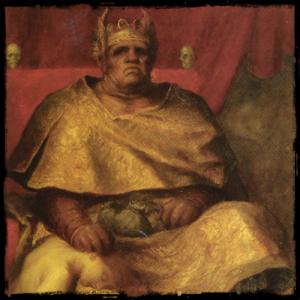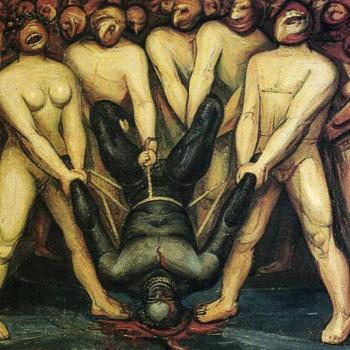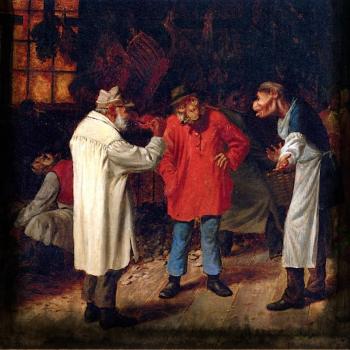The Creation Project excavates Western history using the conceptual tools of complexity science. The contemporary story that foregrounds this archeological dig emphasizes the philosophical and political influence in the past five decades of a reactionary slice of American Catholicism. In this period, the ideas, organizations, and personalities of impresarios ranging from Antonin Scalia to Robert George to Leonard Leo to Steve Bannon have driven wedge politics and moved the political landscape decisively to the right.
This focus on “radical traditionalist” undercurrents of conservative American politics allows us to explore interesting, important, relevant, and hitherto underreported themes that inflect the conservative crusade to claim control of federal courts for the next 30 years. These themes include:
- the intellectual and organizational background to the political success of Culture War Catholics;
- the political influence of leading conservative Catholic intellectuals who use philosophies of natural law to frame their perspectives on politics and society; and
- the political meaning of the originalist and textualist philosophies of the Federalist Society and of the conservative judges whom they have worked to promote to the federal bench.
The effect of these undercurrents have been to shift American jurisprudence from a historically dominant “New England Protestant” legal culture based on traditions of English common law, commitments to legal precedent, and philosophies of positive law and legal realism to an emergent Catholic jurisprudence based on Thomist natural law and a Constitutional fundamentalism derived from the sacred text assumptions of revealed religion. The two most important bridge institutions of this shift toward a Catholic jurisprudence are The Heritage Foundation and The Federalist Society.
Post-War Loomings
Catholic perspectives informed the pontification of Cold War conservative intellectuals, although indirectly and unsystematically. William F. Buckley, also a (devout and mystically inclined) Irish-Catholic, remains for many the father of modern conservative ideology, a robust supporter of fellow Irish-Catholic and Trump precursor, Joseph McCarthy, whose chief counsel Roy Cohn became young Donald Trump’s chief fixer, and who organized his defense of both faith and markets in response to the secular and statist threats of godless communism. However, Buckley, whose legendary gift for the incendiary phrase and artful riposte routinely electrified and inspired his fan base, remained largely a man of words, consistently most comfortable interposing himself (to preserve an ironic space for his unique brand of commentary) between civil society and the halls of power.
At the same time, politically conservative philosophical perspectives established an institutional academic presence in diverse locations, specifically at the University of Chicago, where Leo Strauss held court, but also at tradition-minded Catholic colleges and universities such as Notre Dame and Georgetown and, more idiosyncratically, at smaller liberal arts colleges such as Claremont College and St. Johns College. The common mission of these institutions was to elucidate the intricacies of a disembodied, thematically timeless, literary canon dating to ancient Greek philosophy and threading its way forward through the medieval and early modern history of Europe, largely mediated by and in relation to Christian religious institutions and religious ideas that for centuries exercised dominion over European society. To get some of the flavor of this discourse, one can still read just about anything published in the Claremont Review of Books.
These philosophically driven liberal arts institutions also made more historically specific (and politically directed) claims about how classical and Christian conceptions informed the founding ideals of nationhood in the United States. Such deductions became the basis for theorizing from scholars such as Claremont’s Harry Jaffa (one of Leo Strauss’s first Ph.D. students at Chicago) about the American nation’s “unique” and “exceptional” world-historical status, derived from its embodiment of the principles of natural law and free markets. However, while conservatives in other academic disciplines, such as economics, could claim both sway and swag for the influence they exercised over government policy, the post-Roe generation of natural law philosophers – including John Finnis, Robert P. George, Germain Grisez, and Hadley Arkes – remained largely sequestered in their ivory towers.
During the 1970s and 1980s (as Jane Mayer and others have written), super-wealthy American businessmen, such as Charles Koch, who were deeply concerned about the direction of American politics and the corrosive effect upon their interests and values of liberal higher education and media establishments, began to systematically funnel vast amounts of money into foundations and think tanks explicitly designed to influence public opinion, public policy, and public morals. While much of this wealth funded libertarian public policy organizations like the Cato Institute, contributors also generously funded development, within the foundation/think tank world, of a neo-Thomist faith-based philosophy designed to spiritually moor the conservative political insurgency.
The Heritage Foundation and the Federalist Society are two of the most influential policy institutes to benefit from these infusions. Both organizations internalize and propagate the baseline precepts of Culture War Catholicism, and both have arguably become institutional foundations of Republican Party power no less significant than Fox News, and perhaps more dangerous because gilded with the sheen of academic respectability.
The Heritage Foundation
The Heritage Foundation was established in 1973 with early financial support from Joseph Coors. and under the leadership, initially, of Paul Weyrich, who was also a founder of the American Legislative Exchange Council (ALEC) and the Moral Majority. Weyrich, who also espoused Dominionism (think Sharia Law for Christians) was generally a hot piece of work functioning, in many respects, as his generation’s Steve Bannon.
Edwin Feulner served as president of the Heritage Foundation for 36 years (from 1977-2013), before briefly returning to this role following the ouster of Jim DeMint). Feulner’s specific organizational and tactical innovation marked a departure from the traditional approach of more “unbiased” and technocratically oriented think tanks such as the Brookings Institution.
Feulner imagined Heritage as both an ideas and advocacy organization, built not to respond after the fact to political and policy developments, but instead to proactively and aggressively shape and influence these developments in relation to philosophically grounded conservative commitments to free enterprise, limited government, individual liberty (including what has become known as “religious liberty”), a vague notion of “traditional” American values, and a strong national defense. Weyrich, and Feulner, both raised as Catholics (as was Coors), also infused their organization with a tough-minded, patristic edge deeply informed by the timeless truths associated with Biblical revelation, canon law, papal teachings, and natural law philosophy.
Heritage cares about political and moral philosophy, with large collections of reports and statements about the founders, conservatism, and progressivism. Heritage cares about religion, as a foundation for freedom, democracy, and civilization. Heritage also cares about laws and policies concerning education, sexuality, gender, conception, contraception, marriage, children, and the family, all of which Heritage views through the lens of religious liberty and an expansive definition of the First Amendment.
In other words, the Heritage Foundation cares about a host of matters that are of bedrock concern to the more conservative, flame-throwing wing of the Catholic Church hierarchy (those, like “St. Louis” Cardinal Raymond Leo Burke, who are more tuned to the Steve Bannon frequency) and that it addresses in rigorously neo-Thomistic philosophical language which one almost never encounters in other policy research environments (see lectures on natural law from Diarmuid O’Scannlain, Ryan Anderson, David Forte, and Russell Kirk).
The Federalist Society
With a narrower and more exclusively legal and constitutional focus, the Federalist Society in many respects operates as a junior partner of the Heritage Foundation on matter of legal and judicial policy and advocacy. The Society was founded in the early 1982 as a seedbed for nurturing conservative legal principles among students at otherwise “liberal” law schools.
Early supporters included Attorney General Edwin Meese, Solicitor-General Robert Bork, and Supreme Court Justice Antonin Scalia, who became the organization’s beloved godfather until his death in 2016. The Federalist Society’s membership has also included Supreme Court justices John Roberts, Samuel Alito, Clarence Thomas, Neil Gorsuch, Brett Kavanaugh, and literally every Trump nominee to the federal bench. Of course, Scalia, Roberts, Alito, Thomas, and Kavanaugh are (or were) all practicing Catholics, while Gorsuch was raised devoutly Catholic. Robert Bork converted to Catholicism in 1987 at the age of 76.
The Federalist Society’s Executive Vice President, Leonard Leo, is a devout Catholic who served three terms on the U.S. International Committee on Religious Freedom and performed outreach and strategy roles for the Catholic Church in U.S. political campaigns. Leo shepherded the Supreme Court Senate confirmations of John Roberts and Samuel Alito. Leo also closely guided the process that selected Neil Gorsuch and Brett Kavanaugh to fill the vacant seats of Antonin Scalia and Anthony Kennedy. Grandson of a Brooks Brothers vice-president, Leo is, as Jeffrey Toobin writes, the bella figura of the legal conservative movement, well-accoutered and unflappable. As Toobin also notes, Leonard Leo’s life “has been shaped as much by Catholicism as by conservatism.”
More focused on its education mission and less of a research body than the Heritage Foundation, the Federalist Society is specifically anchored to what I (but perhaps no one else) would argue is a Fideist commitment to constitutional originalism and textualism (the fetish of the text as holy writ shared with Thomist natural law proponents, Protestant evangelists, and Islamist fundamentalists alike). The Federalist Society also shares with the Heritage Foundation an ingrained belief in the natural law as precursor to and ultimate measure of positive law (hence the backbreaking efforts of many legal philosophers to claim the Constitution itself fully conforms to the natural law precepts of St. Thomas). A search on the Federalist Society website retrieves links to more than 300 publications or events that refer to natural law, including Judge Diarmuid O’Scannlain’s warm review of Hadley Arkes’s book, Constitutional Illusions and Anchoring Truths: The Touchstone of the Natural Law).
While the overt influence of the traditional menu of Christian religion, sex, and family issues may be less pronounced in the education and advocacy work of the Federalist Society, the organization’s legal focus makes it an ideal vehicle for representing these values in the courtroom and in other public venues concerned with legal philosophy and jurisprudence.
Serving God and Mammon
The Heritage Foundation and Federalist Society are not austere temples for the mind. Unapologetically creatures of the City of Man, these organizations are awash in cash, endowments, and emoluments about which most of us can only dream. In 2016 (the year for their latest publicly available IRS form 990), Heritage, with 600 employees, disclosed annual revenue of more than $82 million, with net assets of more than $240 million, and with at least 14 employees earning more than $300,000 annually.
The Federalist Society is less research-oriented and far smaller than Heritage, with fewer than 100 employees, but in 2017 reported more than $20 million in revenue, more than $28 million in net assets, and at least four employees earning more than $300,000 annually (in 2016, Leonard Leo received compensation from The Federalist Society approaching $500,000).
The money by itself does not explain the influence of natural law concepts that frame and support nearly every program and policy initiative of the Heritage Foundation and Federalist Society. But the money is incredibly enabling because it serves as its own justification. Prestige and legitimacy (and hence confidence and assuredness) simply inhere to well-funded philosophers working in comfortable environments in proximity to other powerful people and institutions. Possibilities in life and in law that were once contingent for philosophers laboring in academic obscurity have become self-evident and natural for those now feted and fawned upon in the lap of ambient luxury. It’s good to be a Thomist.













